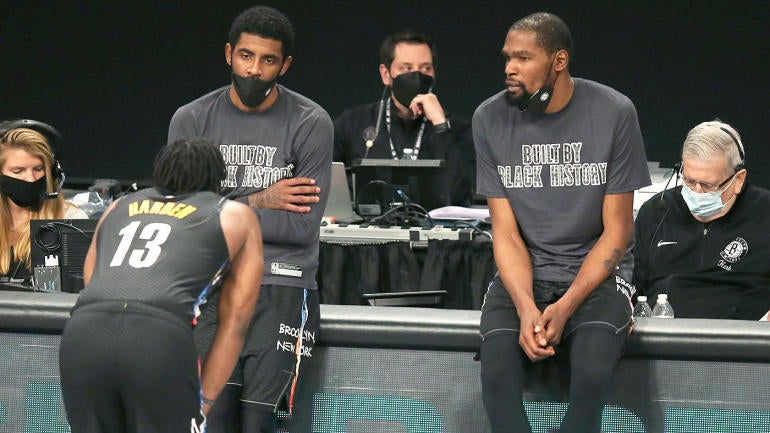
Isiah Thomas once said that championships are won on the bus. It's a somewhat antiquated idea three decades later, with rosters in constant flux and players spending downtimes glued to cellphones, but the message is timeless: Camaraderie and chemistry matter as much as talent. In Thomas' day, rosters were so stable that it could happen primarily off the court. Teammates spent so many years together that they could run their system in their sleep.
In the superteam era, it needs to happen on the floor. Rosters built in July are expected to win in June, and that demands rapid-fire growth from rosters that no longer have the privilege of patience. Just ask the Clippers what happens when chemistry isn't prioritized. Punting games in January has consequences in May.
Of course, those Clippers weren't as talented as the current Brooklyn Nets. You'd be hard-pressed to find many teams in history that are, and that makes them the ultimate test of chemistry's importance in the new NBA. With Kevin Durant still nursing a thigh contusion and James Harden likely to miss multiple weeks with a hamstring strain, the Nets are going to enter the postseason with less experience together than any contender in NBA history.
As common as star groupings have become, only one post-merger NBA champion has ever had three leading scorers that had never played together before the season began. That team was the 2008 Boston Celtics. That trio of Ray Allen, Paul Pierce and Kevin Garnett played 65 total games together that regular season for a total of 1,690 total minutes. So far this season, Harden, Durant and Kyrie Irving have appeared in just seven games together. They've played only 186 minutes in that time. As a point of reference, consider the champion that the Nets are trying to unseat. The LeBron James-Anthony Davis duo had doubled that minutes total by Thanksgiving of last season.
The Lakers only had two stars last season. Three-star outfits are decidedly rarer, so broadening our scope a little bit, let's look at every playoff team over the past decade whose top three scorers hadn't played a single game together prior to that season.
| Team (Top three scorers) | Minutes together | Games together | Result | Seed |
|---|---|---|---|---|
2019-20 Clippers (Leonard-George-Harrell) | 247 | 29 | Lost in Round 2 | Higher |
2019-20 Pacers (Brogdon-Sabonis-Warren) | 909 | 43 | Lost in Round 1 | Higher |
2019-20 Thunder (Gilgeous-Alexander-Schroder-Gallinari) | 669 | 56 | Lost in Round 1 | Lower |
2018-19 76ers (Embiid-Butler-Harris) | 208 | 11 | Lost in Round 2 | Lower |
2017-18 Thunder (Westbrook-George-Anthony) | 1,976 | 75 | Lost in Round 1 | Higher |
2016-17 Rockets (Harden-Gordon-Anderson) | 774 | 63 | Lost in Round 2 | Lower |
2014-15 Cavaliers (James-Irving-Love) | 1,442 | 60 | Lost in Finals | Lower |
2010-11 Heat (James-Wade-Bosh) | 1,916 | 72 | Lost in Finals | Higher |
This is an imperfect list on several levels. Injuries doomed some of these teams. One, the 2019-20 Thunder, laughably, doesn't even include that team's best player (Chris Paul) because of how balanced its offense was. Some of these teams don't have three stars, but points per game is the quickest measure here. But broadly, we see a trend here: Unite three high-level scorers and you lose in Year 1. That has held true across talent levels and experience levels. The 2019-20 Clippers lost with their top trio having played barely any more minutes than the Nets stars have. The 2010-11 Heat lost with almost 2,000 minutes together under their belts. Both were championship favorites. Both were upset. Historically speaking, it tends to take a whole season for groups like this to coalesce into champions.
In fact, "a whole season" might be generous. While absurdly talented outliers like the 2008 Celtics and the 2017 Warriors exist, most champions struggle together for years before reaching the mountaintop. Kobe Bryant and Shaquille O'Neal lost in the playoffs three times before winning the title. So did Scottie Pippen and Michael Jordan. Stephen Curry and Klay Thompson won their first title on their third try. Dirk Nowitzki didn't have a traditional co-star in Dallas, but he lost six times with Jason Terry before finally nabbing the title in 2011. Again, we're dealing with imperfect qualifiers here, as most of these champions didn't start their runs with everybody in their prime, but there is a small sample of NBA champions to begin with. Only one team gets to win it all in a given season.
That small sample size invites chaos. Perhaps chemistry has overcome talent at the highest levels simply because a sufficiently talented juggernaut hasn't yet presented itself. The Nets might be such a team. They might be so good that their limited experience together doesn't even matter.
It's a fascinating case study for the superteam era, because teams like the Nets aren't going away. They may be the first team in NBA history to boast three All-NBA-caliber primary ball-handlers, but if recent history is to be believed, they won't be the last. The limits of roster-building continue to be pushed with each passing offseason. Brooklyn winning the title would be proof that in the 2020s, championships are no longer won on the bus. They're won in boardrooms and backrooms and wherever else superstars dream up their partnerships. It would be the ultimate testament to the thesis that most NBA teams have been operating under for the past decade: Talent trumps all.


















